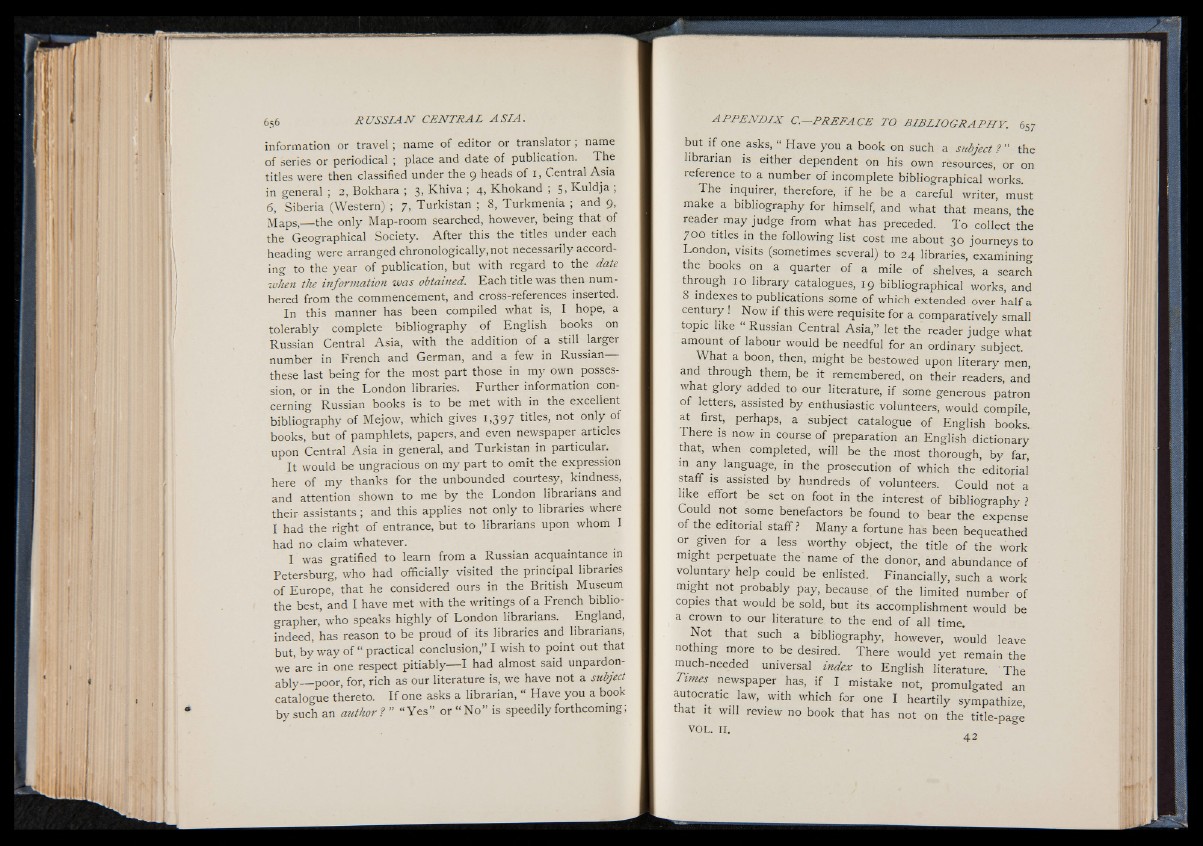
656 R U S S IA N CEN TRAL A S IA .
information or tra v e l; name of editor or translator; name
of series or periodical ; place and date of publication. The
titles were then classified under the 9 heads of 1, Central Asia
in general ; 2, Bokhara ; 3, Khiva ; 4, Khokand ; 5, Kuldja ;
6, Siberia (Western) ; 7, Turkistan ; 8, Turkmenia ; and 9,
Maps,— the only Map-room searched, however, being that of
the Geographical Society. After this the titles under each
heading were arranged chronologically,not necessarily according
to the year of publication, but with regard to the date
when the information was obtained. Each title was then numbered
from the commencement, and cross-references inserted.
In this manner has been compiled what is, I hope, a
tolerably complete bibliography of English books on
Russian Central Asia, with the addition of a still larger
number in French and German, and a few in Russian—
these last being for the most part those in my own possession,
or in the London libraries. Further information concerning
Russian books is to be met with in the excellent
bibliography of Mejow, which gives 1,397 titles, not only of
books, but of pamphlets, papers, and even newspaper articles
upon Central Asia in general, and Turkistan in particular.
It would be ungracious on my part to omit the expression
here of my thanks for the unbounded courtesy, kindness,
and attention shown to me by the London librarians and
their assistants; and this applies not only to libraries where
I had the right of entrance, but to librarians upon whom I
had no claim whatever.
I was gratified to learn from a Russian acquaintance in
Petersburg, who had officially visited the principal libraries
o f Europe, that he considered ours in the British Museum
the best, and I have met with the writings o f a French bibliographer,
who speaks highly o f London librarians. England,
indeed, has reason to be proud o f its libraries and librarians,
but, b y w a y o f “ practical conclusion,” I wish to point out that
we are in one respect pitiably— I had almost said unpardonably
poor, for, rich as our literature is, we have not a subject
catalogue thereto. I f one asks a librarian, “ Have you a book
by such an a u th o r?” “ Y e s ” or “ N o ” is speedily forthcoming;
A P P E N D IX C.—P R E F A C E TO B IB L IO G R A PH Y . 657
but if one asks, “ Have you a book on such a subject ? ” the
librarian is either dependent on his own resources, or on
reference to a number of incomplete bibliographical works.
The inquirer, therefore, if he be a careful writer, must
make a bibliography for himself, and what that means, the
reader may judge from what has preceded. I'o collect the
700 titles in the following list cost me about 30 journeys to
London, visits (sometimes several) to 24 libraries, examining
the books on a quarter of a mile of shelves, a search
through 10 library catalogues, 19 bibliographical works, and
8 indexes to publications some of which extended over half a
century ! Now if this were requisite for a comparatively small
topic like Russian Central Asia,” let the reader judge what
amount of labour would be needful for an ordinary subject.
What a boon, then, might be bestowed upon literary men,
and through them, be it remembered, on their readers, and
what glory added to our literature, if some generous patron
of letters, assisted by enthusiastic volunteers, would compile,
at first, perhaps, a subject catalogue of English books.’
There is now in course of preparation an English dictionary
that, when completed, will be the most thorough, by far,
m any language, in the prosecution of which the editorial
staff is assisted by hundreds of volunteers. Could not a
like effort be set on foot in the interest of bibliography ?
Could not some benefactors be found to bear the expense
of the editorial staff? Many a fortune has been bequeathed
or given for a less worthy object, the title of the work
might perpetuate the name of the donor, and abundance of
voluntary help could be enlisted. Financially, such a work
might not probably pay, because of the limited number of
copies that would be sold, but its accomplishment would be
a crown to our literature to the end of all time.
Not that such a bibliography, however, would leave
nothing more to be desired. There would yet remain the
much-needed universal index to English literature The
Times newspaper has, if I mistake not, promulgated an
autocratic law, with which for one I heartily sympathize
that it will review no book that has not on the title-page
VOL. XI.